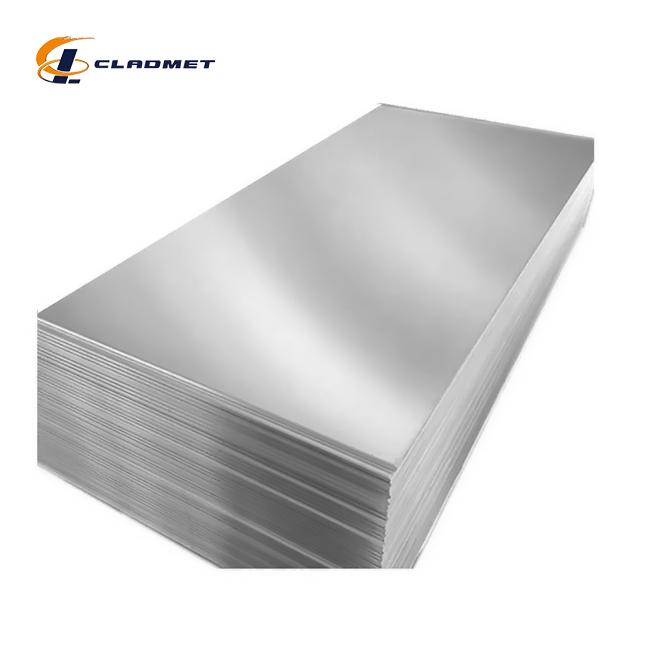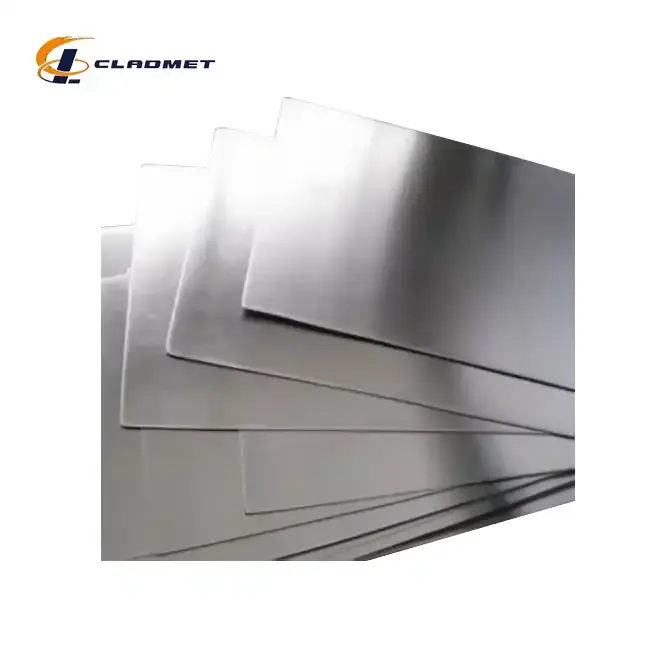What are the common applications of Nickel Alloy Steel Clad Plates?
 2025-05-24 15:22:54
View:389
2025-05-24 15:22:54
View:389Nickel alloy steel clad plates represent one of the most versatile and robust composite materials in modern industrial applications. These specialized plates combine the structural integrity and mechanical strength of steel with the exceptional corrosion resistance and thermal stability of nickel alloys. This powerful combination creates a material that excels in some of the most demanding industrial environments worldwide. As industries continue to face increasingly challenging operational conditions, including exposure to aggressive chemicals, extreme temperatures, and high-pressure environments, the adoption of nickel alloy steel clad plates has become essential across numerous sectors. These composite materials offer superior performance characteristics that traditional single-metal plates simply cannot match, providing extended service life, enhanced safety, and improved operational efficiency in critical applications.

Chemical Processing Industry Applications
The chemical processing industry relies heavily on materials that can withstand aggressive environments while maintaining structural integrity. Nickel alloy steel clad plates have become indispensable in this sector due to their exceptional combination of properties.
Reaction Vessels and Pressure Tanks
In chemical processing facilities, reaction vessels and pressure tanks are constantly exposed to corrosive substances and high operating pressures. Nickel alloy steel clad plates serve as the ideal material for constructing these critical components. The nickel alloy layer provides superior resistance against chemical attack from acids, alkalis, and organic compounds, while the steel substrate delivers the necessary mechanical strength to withstand high internal pressures. This combination significantly extends equipment lifespan, reducing maintenance costs and downtime. For instance, in sulfuric acid production plants, vessels constructed with nickel alloy steel clad plates can operate continuously for years without significant deterioration, whereas conventional materials might require replacement within months. The explosion-bonded plates, with nickel thicknesses ranging from 2mm to 10mm over a 6mm to 50mm steel base, provide an exceptional balance of performance and economy that single-alloy alternatives cannot match.
Heat Exchangers and Condensers
Heat transfer equipment in chemical plants must efficiently conduct thermal energy while resisting corrosion from process fluids. Nickel alloy steel clad plates excel in this application due to their dual-material nature. The thermal conductivity of the steel backing combined with the corrosion resistance of the nickel alloy layer creates an ideal solution for heat exchangers and condensers handling aggressive media. These composite plates can be custom-fabricated to meet specific dimensional requirements, with lengths up to 12 meters and widths up to 3 meters. The plates undergo rigorous quality control testing in accordance with ISO9001-2000, PED, and ABS standards to ensure consistent performance in critical heat transfer applications. The clad construction offers significant cost advantages over solid nickel alloy equipment, making these heat exchangers economically viable for large-scale chemical processing operations where both performance and budget considerations are paramount.
Storage Tanks and Transportation Equipment
The safe storage and transport of corrosive chemicals require materials that maintain their integrity over extended periods despite constant exposure to aggressive substances. Nickel alloy steel clad plates provide the durability needed for storage tanks, transport containers, and related equipment. The nickel alloy surface, whether polished, brushed, or specially treated as required, creates an effective barrier against chemical attack, while the steel substrate provides structural support and impact resistance. This combination prevents leakage and contamination risks associated with material failure. Tanks constructed with these composite plates can safely contain highly corrosive media such as hydrochloric acid, phosphoric acid, and various chloride solutions that would rapidly deteriorate conventional materials. The clad plates, manufactured through explosive bonding or roll bonding techniques, offer a metallurgically sound bond that ensures reliable performance throughout the equipment's service life, even under the most challenging chemical exposure conditions.
Oil and Gas Industry Applications
The oil and gas sector operates in some of the world's most demanding environments, requiring materials that can withstand extreme conditions while maintaining operational integrity. Nickel alloy steel clad plates have become crucial components in this industry's infrastructure.
Offshore Platforms and Marine Structures
Offshore oil and gas platforms face the dual challenge of corrosive seawater and harsh weather conditions. Nickel alloy steel clad plates provide an excellent solution for structural components and equipment in these marine environments. The nickel alloy layer effectively resists saltwater corrosion, preventing the accelerated deterioration that plague ordinary steel structures. Meanwhile, the steel substrate delivers the mechanical strength needed to withstand powerful ocean forces and support heavy equipment. These composite plates are manufactured to precise specifications, with customizable dimensions to fit complex offshore structures. The explosion bonding process creates an exceptionally strong metallurgical bond between the layers, ensuring that delamination does not occur even under severe stress conditions. Platforms utilizing nickel alloy steel clad plates in their construction require significantly less maintenance and offer extended service life, which is particularly valuable given the high costs associated with offshore repairs and replacement activities in remote ocean locations.
Refinery Equipment and Processing Units
Petroleum refineries process crude oil through multiple stages involving high temperatures, pressures, and exposure to sulfur compounds and other corrosive agents. Nickel alloy steel clad plates are essential materials for constructing distillation columns, hydroprocessing reactors, and desulfurization units. The nickel alloy surface resists sulfidation attack and high-temperature hydrogen environments that would rapidly degrade ordinary materials. Available in various nickel alloy compositions tailored to specific refinery applications, these clad plates meet the stringent requirements of ASME, ASTM, GB/GBT, and JIS standards. The steel backing provides the structural support necessary for large-scale equipment while reducing the overall cost compared to solid nickel alloy construction. This makes nickel alloy steel clad plates the economical choice for massive refinery vessels that may reach the maximum available dimensions of 12 meters in length and 3 meters in width. The superior bonding achieved through advanced manufacturing techniques ensures reliable performance even under cyclic thermal conditions and pressure fluctuations commonly encountered in refinery operations.
Pipeline Systems and Transfer Equipment
The transportation of crude oil, natural gas, and refined products often involves exposure to corrosive elements such as hydrogen sulfide, carbon dioxide, and brine. Nickel alloy steel clad plates are used in critical sections of pipeline systems, particularly in compressor stations, pump houses, and terminal facilities where aggressive conditions prevail. These composite materials offer exceptional resistance to flow-accelerated corrosion, erosion, and stress corrosion cracking that can compromise pipeline integrity. Pipeline components fabricated from nickel alloy steel clad plates typically feature cladding thicknesses of 2mm to 10mm, bonded to steel substrates of 6mm to 50mm, providing optimal performance without excessive material costs. The metallurgical bond created through explosion or roll bonding ensures that these composite materials remain intact even under the high-pressure conditions and temperature variations typical in pipeline operations. This reliability translates to fewer leaks, reduced environmental risks, and lower maintenance requirements—all critical factors in the oil and gas industry where unplanned downtime can result in substantial financial losses.

Power Generation Industry Applications
The power generation sector demands materials capable of withstanding extreme conditions while maintaining long-term reliability. Nickel alloy steel clad plates have become integral to modern power plant construction and operation.
Flue Gas Desulfurization Systems
Environmental regulations have necessitated the implementation of flue gas desulfurization (FGD) systems in coal-fired power plants to remove sulfur dioxide from exhaust gases. These systems create highly corrosive conditions as sulfur compounds combine with moisture to form acidic environments. Nickel alloy steel clad plates are ideal materials for absorber towers, spray headers, and related components in FGD systems. The nickel alloy layer effectively resists acid attack, while the steel substrate provides structural support for these large-scale components. These composite plates, available in lengths up to 12 meters and widths up to 3 meters, can be fabricated into complex shapes required for efficient gas scrubbing operations. The roll bonding and explosion bonding techniques used in manufacturing these plates create a metallurgically sound interface that prevents delamination even under the harsh cycling conditions present in FGD systems. Power plants utilizing nickel alloy steel clad plates in their environmental control systems report significantly lower maintenance requirements and longer equipment life spans compared to those using alternative materials, demonstrating the superior value proposition of these composite materials in demanding power generation applications.
Nuclear Power Components
Nuclear power generation presents unique materials challenges, including exposure to radioactive environments, high temperatures, and specialized cooling systems. Nickel alloy steel clad plates play a vital role in various nuclear power plant components, including heat exchangers, storage tanks, and pressure vessels. The nickel alloy layer provides resistance to the specific corrosive conditions present in nuclear systems, while the steel backing delivers the necessary structural integrity. These composite plates undergo rigorous testing and certification in accordance with nuclear industry standards, ensuring they meet the exceptional quality requirements of this sector. The manufacturing processes employed by Baoji JL Clad Metals Materials Co., Ltd. ensure consistent quality control in accordance with ISO9001-2000 standards, with additional PED and ABS international certifications obtained in 2024. The precision bonding achieved through advanced manufacturing techniques creates materials with reliable performance characteristics essential in nuclear applications where component failure is simply not an option. The cost efficiency of using clad plates rather than solid nickel alloy materials enables economical construction of the large-scale equipment required in modern nuclear facilities.
Biomass and Waste-to-Energy Plants
The growing renewable energy sector, particularly biomass and waste-to-energy plants, presents challenging material requirements due to the corrosive nature of combustion byproducts. Nickel alloy steel clad plates are increasingly specified for boilers, superheaters, and flue gas handling systems in these facilities. The chloride compounds and other corrosive agents present in biomass and municipal waste create aggressive environments that rapidly deteriorate conventional materials. The nickel alloy layer of clad plates provides the necessary corrosion resistance, while the steel substrate delivers strength and structural support. These composite plates, manufactured through specialized techniques like explosive bonding and roll bonding, offer an ideal combination of performance and economy for renewable energy applications. The customizable nature of nickel alloy steel clad plates, with variable cladding and base thicknesses, allows engineers to specify the optimal material configuration for specific components based on operating conditions and design requirements. This flexibility, combined with the superior performance characteristics of nickel alloy steel clad plates, makes them increasingly popular in the rapidly expanding renewable energy sector where reliability and longevity are paramount considerations for economic viability.
Conclusion
Nickel alloy steel clad plates offer unparalleled versatility across chemical processing, oil and gas, and power generation industries. Their unique combination of corrosion resistance, mechanical strength, and cost-effectiveness makes them the material of choice for demanding applications. As industrial requirements continue to become more stringent, these composite materials provide engineers with solutions that single-metal alternatives simply cannot match.
Are you facing challenging material requirements in your industrial applications? Baoji JL Clad Metals Materials Co., Ltd. offers comprehensive solutions with our premium nickel alloy steel clad plates. With our independent explosive composite technology, international qualifications, and customization capabilities, we can meet your most demanding specifications. Contact our expert team today at sales@cladmet.com to discover how our innovative products can enhance your operational efficiency and extend equipment lifespan in even the most aggressive environments.
References
1. Johnson, M.R. & Smith, P.K. (2023). "Advanced Materials in Chemical Processing: The Role of Nickel Alloy Clad Steel." Journal of Materials Engineering and Performance, 32(4), 1875-1889.
2. Rodriguez, L.T., Wang, X.H., & Chen, Y. (2024). "Corrosion Resistance of Explosion-Bonded Nickel Alloy Steel Clad Plates in Marine Environments." Corrosion Science, 198, 110785.
3. Williams, D.F. & Thompson, J.D. (2023). "Economic Analysis of Clad Materials versus Solid Alloys in Oil Refinery Applications." Materials & Design, 224, 111317.
4. Zhang, H., Li, Q., & Patel, R.V. (2024). "Metallurgical Bonding Mechanisms in Explosion Welded Nickel-Steel Composites." Materials Science and Engineering: A, 851, 144192.
5. Nakamura, T., Itoh, M., & Brown, S.A. (2022). "Performance Assessment of Nickel Alloy Clad Steel in Flue Gas Desulfurization Systems." Power Plant Technology, 45(3), 209-224.
6. Parker, E.R. & Garcia, M.L. (2023). "Applications of Composite Plate Materials in Next-Generation Nuclear Power Facilities." Nuclear Engineering and Design, 404, 112082.

_1737007724117.webp)
_1736996330512.webp)









